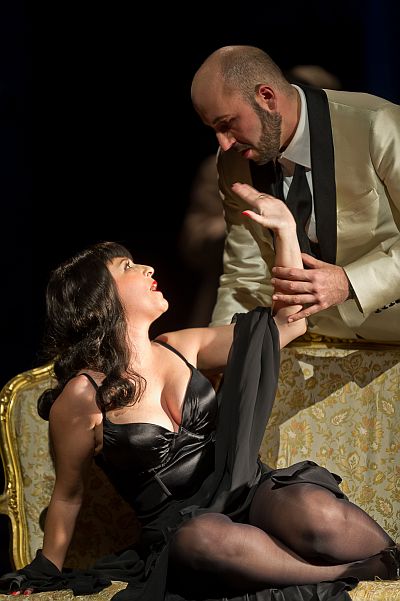![]() Ireland Emmanuel Chabrier, Le Roi malgré lui: Soloists, Chorus and Orchestra of Wexford Festival Opera / Jean-Luc Tingaud (conductor), Wexford Opera House, 3.11.2012. (ASB)
Ireland Emmanuel Chabrier, Le Roi malgré lui: Soloists, Chorus and Orchestra of Wexford Festival Opera / Jean-Luc Tingaud (conductor), Wexford Opera House, 3.11.2012. (ASB)
Cast:
Henri de Valois – Liam Bonner
Comte de Nangis – Luigi Boccia
Le Duc de Fritelli – Frédéric Gonçalvès
Minka – Mercedes Arcuri
Alexina – Nathalie PaulinLaski – Quirijn de Lang
Basile – Thomas Morris
Lincourt – Carlos Nogueira
D’Elboeuf – Lawrence Thackeray
Maugiron – Simon Robinson
Comte de Caylus – Owen Webb
Marquis de Villequier – Simon Meadows
A Soldier – Colin Brockie
Dancers – Jan Patzke, Ryan O’Neill, Aaron Jones, Olivia Qualye, Jenny Reeves, Máire Dee
Production:
Director: Thaddeus Strassberger
Assistant Director: Joel Ivany
Set Designer: Kevin Knight
Costume Designer: Mattie Ulrich
Lighting Designer: Simon Corder
Choreographer: Marjorie Folkman
Choreography restaging: Paula O’Reilly
Dramaturg: Julia Eberwein
Chorus Master: Gavin Carr

The second offering of the Wexford Festival Opera promised to be exactly the right antidote to the gloom and doom of the previous night. My hope was that Chabrier’s Le Roi malgré lui would turn out to be as great a production of a comic opera as Cilèa’s L’Arlesianna was that of a heart-rending tragedy. Alas, it was not to be. Not that it was a bad performance: in fact, it was musically engaging and visually stunning; yet something was missing. It felt as if the different parts of Chabrier’s opéra comique did not quite merge to form a coherent whole that evening, which – at least to my mind – was due above all to three reasons.
First – and probably foremost – the libretto is a real let-down. It focusses on French King Henri de Valois, who is about to also become king of Poland, a prospect that does not appeal to the monarch, who much rather would like to return to his Gallic homeland as quickly as possible. To propel this, a disguised Henri takes part in a plot against himself, concocted by Polish aristocrats, and is chosen to be his own assassin. Secret liaisons and mistaken identities complicate the plot further, before Henri finally decides to accept the Polish crown to become the King in spite of himself. Not only is this story line long-winded, unnecessarily packed with side- and subplots, it is also genuinely difficult to sympathise with any of the characters, who by and large are simply not very interesting or engaging.
The second problem lies in the score, with which, it seems, Chabrier wanted to demonstrate that he was able to master (and he most certainly was!) any idiom that the genre had to offer: High and low style passages are consistently juxtaposed, including patter singing, an Italianate canon of confusion, show-stopping roulades, serious love music in pseudo-Wagnerian chromatic language, an elegiac pavane and a driving choral waltz. The Wexford orchestra delivered all this with the necessary amount of liveliness and esprit under the baton of Jean-Luc Tingaud; and yet – despite its qualities – the music seemed to be as overstuffed with ideas as the plot.
The direction, finally, suffered in a similar vein. To be sure: Thaddeus Straussberger is an exciting director with a keen eye on great images, such as having the homesick Henri enter the stage on a sunbed craving for warmth in a freezing Eastern Europe. The problem is that he has got so many of these wonderful ideas, that they could easily have adorned two productions. From big ship containers in which the French court arrives in Poland in the opening scene, to the appearance of a gondola each time Henri encounters the Polish noblewoman Alexina with whom he had an affair in Venice, to a live television crew reporting from the coronation festivities: much is going on all the time – in fact too much. As a result the performance becomes – in connection with the storyline and the music – exhausting, and, after almost three hours, tiring. To me this is one of the clear instances where less would have been so much more, if only rigorous cuts had been introduced.
This is regrettable since musically there were plenty of good things. A fine cast was spearheaded by the amazing Mercedes Arcuri as the minxy Polish servant girl Minka whose extraordinary display of effortless coloraturas was complemented well by the agile tenor voice of Luigi Boccia as the Comte de Nangis, her lover and the king’s closest friend. Frédéric Gonçalvès, with his amusing portrayal as Henri’s fumbling chamberlain, Le Duc de Fritelli, and Nathalie Paulin as his wife, Alexina, formed another great pair. Liam Bonner in the title role at times lacked the consistency and bredth in his voice, whereas Quirijn de Lang convinced as Henri’s opponent, Count Laski.
Andreas Bücker
